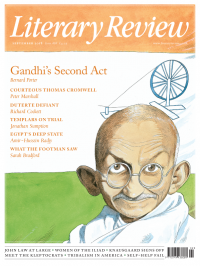Sarah Ditum
The Year of Living Mindfully
Help Me! One Woman’s Quest to Find Out If Self-help Really Can Change Her Life
By Marianne Power
Picador 365pp £14.99
Marianne Power attempted to follow one self-help book per month for a year. I actively avoid them. I felt a particular grinding horror when at the end of a yoga practice (yes, it’s called a practice), my instructor went to a bag, pulled out a book and started reading to us about ‘the law of attraction’ and ‘sending positive vibrations into the universe’. Prone on the deck (yes, you have to say deck, not floor), I could not escape the torrent of alarming platitudes: all outcomes, good and bad, could be attributed to the quality of my vibrations. When disaster comes, it will be down to my inadequate vibing.
The book was Rhonda Byrne’s The Secret, which was the title of choice for the third month of Power’s challenge. ‘It was all deluded and dangerous nonsense – the very worst of self-help,’ points out Power. So why would anyone follow its advice? Then again, why do I spend Wednesday mornings in a village hall contorting myself into stress positions and learning all the special words for it? Because, like most people, I would prefer to be a slightly improved version of myself. A happier, thinner, more actualised (whatever that is) life is shining on the horizon, if only I can surmount the problem of lumpen myself-as-I-am.
The self-help industry services this desire. If you want to be better, these books promise to make you better. Sometimes they do so through the kind of common-sense advice that you can perhaps only bear to listen to if you’ve already paid for the privilege. For month one, she takes up Susan Jeffers’s Feel the Fear and Do It Anyway, following its mantra to ‘do something scary every day’ – something practical (parallel parking), something rewarding (trying stand-up), something simply unenjoyable (skydiving). In month two, things get tougher as she lets Kate Northrup’s Money: A Love Story, which purports to show you how you can fix your finances through such revolutionary means as reading your bank statements, guide her. It seems obvious, but knowing and doing are separate things, and with Northrup’s encouragement Power comes to an overdue reckoning with her debts.
Unfortunately, her response to that reckoning is to leap into the wish-fulfilment fantasies of The Secret, and then hitch herself to a procession of gurus who promise great rewards with no effort (but much expenditure on further books, retreats and merchandise). At a conference/rally/high-pressure sales event starring motivational speaker Tony Robbins, Power (who is most delightful when she zeroes in on bathos) finds herself doing the ‘mashed potato’ with a Norwegian accountant as collective hysteria takes hold. But she also, she records, finds herself convinced by some of the manuals. She wants to believe that following them will lead her to ‘Perfect Me’.
Instead, they lead to breakdown. The discordant counterpoint to her chirpy quest – a startling number of glasses of wine, friends brushed off when their ‘negativity’ threatens her – is brought affectingly to the fore. How much of this is authentic and how much of it has been constructed to serve her tale? The author’s note promises that every incident is ‘real and true’, but also says that the friend characters are composites and that some events have been reordered in the interests of her narrative. Eventually self-help aids her escape from the pit it got her into: Eckhart Tolle’s mindfulness and Brené Brown’s injunction, ‘Connection is why we’re here’, prove truly useful. Power realises, ‘I’d been doing the self-help stuff all wrong. I couldn’t do it alone.’
It’s perverse that Help Me! is classed as non-fiction while, say, Olivia Laing’s Crudo and Joanna Walsh’s Break.up, two recent examples of autofiction, go in the fiction section. It’s even more perverse that Help Me!, with its chipper packaging, is a more moving book than either of them. Help Me! is not a book to change your life (for that, Oliver Burkeman’s excellent The Antidote is your best bet – apparently I do like self-help, as long as it doesn’t look like self-help), and it doesn’t get to the core of why these authors urge us to change our unsatisfactory selves and not the world. But regardless of how ‘real’ it is, it’s a compelling story of crack-up and recovery.

Sign Up to our newsletter
Receive free articles, highlights from the archive, news, details of prizes, and much more.@Lit_Review
Follow Literary Review on Twitter
Twitter Feed
Under its longest-serving editor, Graydon Carter, Vanity Fair was that rare thing – a New York society magazine that published serious journalism.
@PeterPeteryork looks at what Carter got right.
Peter York - Deluxe Editions
Peter York: Deluxe Editions - When the Going Was Good: An Editor’s Adventures During the Last Golden Age of Magazines by Graydon Carter
literaryreview.co.uk
Henry James returned to America in 1904 with three objectives: to see his brother William, to deliver a series of lectures on Balzac, and to gather material for a pair of books about modern America.
Peter Rose follows James out west.
Peter Rose - The Restless Analyst
Peter Rose: The Restless Analyst - Henry James Comes Home: Rediscovering America in the Gilded Age by Peter Brooks...
literaryreview.co.uk
Vladimir Putin served his apprenticeship in the KGB toward the end of the Cold War, a period during which Western societies were infiltrated by so-called 'illegals'.
Piers Brendon examines how the culture of Soviet spycraft shaped his thinking.
Piers Brendon - Tinker, Tailor, Sleeper, Troll
Piers Brendon: Tinker, Tailor, Sleeper, Troll - The Illegals: Russia’s Most Audacious Spies and the Plot to Infiltrate the West by Shaun Walker
literaryreview.co.uk